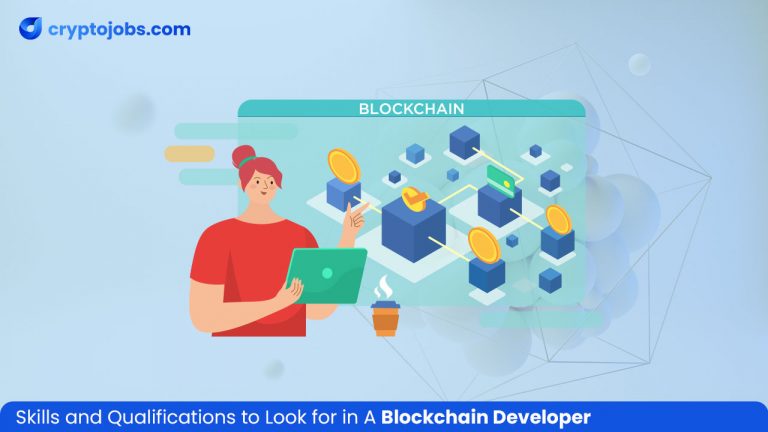
Skills and Qualifications to Look for in A Blockchain Developer
- cryptojobs.com
- March 27, 2024
- All Posts, Skill Enhancement
- hiring
- 0 Comments
Blockchain technology has come a long way. Expanding from its roots in cryptocurrency, the decentralized ledger has found its way into all sorts of industries. It creates a secure and transparent environment where the participants can interact with each other without any intermediaries. Developing such a unique network requires serious skills and training. Businesses want to implement blockchain applications in their operations but cannot do so without a skilled blockchain developer leading them.
With many blockchain developer jobs available, many aspirants are considering this career pathway. But how do you identify a truly qualified blockchain developer from the rest? By analyzing their skills, of course. While not every blockchain developer is truly skilled in every area, they do understand what it takes to deploy an effective blockchain network and its applications.
To help you out, we have rounded up the skills you should look for in a blockchain developer. Have a look!
Understanding the Responsibilities of a Blockchain Developer
A blockchain developer develops a decentralized, tamper-proof database for storing transactions and other records. In this regard, a blockchain developer may have many roles and responsibilities. They might be responsible for a blockchain network, the applications that operate on that network, or a mixture of both. They may be tasked with any of the following duties:
- Research, analyze, and design blockchain networks, their consensus mechanisms, and the decentralized applications to run on them.
- Ensure security and compliance across the entire blockchain network.
- Build, test, monitor, and maintain a blockchain network with a special focus on distributed computing, consensus protocols, performance, cryptography, and security.
- Research new tools and learn how to integrate them into existing blockchain networks and applications.
- Develop, test, monitor, and maintain smart contracts, decentralized applications, client-side applications, back-end systems and other components making up the application stack.
- Document best practices, development processes, and artifacts of blockchain systems and applications.
- Use soft skills to collaborate with coworkers and work as a team.
Blockchain Developer Skills to Look Out For
Qualified blockchain developers bring a wide range of skills and an extensive breadth of knowledge to a company. When assessing different candidates, recruiters sometimes cannot decide which skills to pursue. You should determine the skills and qualifications you want in your blockchain developer by assessing the company’s specific needs. Even so, there are some essential skills that every blockchain development professional must have. They are as follows:
Check out: 5 Skills to Secure a Blockchain Developer Job
Blockchain Architecture
Being skilled in blockchain architecture means having a complete understanding of blockchain. A qualified blockchain developer knows how blockchain technology works and how the network architecture supports its functionality. They understand technicalities integral to blockchain’s internal workings, such as cryptography, smart contracts, distributed ledgers, hash functions, decentralized applications, etc. Moreover, they should also know about the different blockchain architectures and consensus algorithms, such as proof of work or proof of stake.
Cryptography
Cryptography is an essential element of blockchain technology. Effective cryptography ensures a secure blockchain environment where nobody can tamper with individual transactions. A qualified blockchain developer has a strong cryptographic foundation. They know about wallets, keys, digital signatures, and symmetric/asymmetric encryption. They understand the differences between cryptographic hash functions and know how to use public keys without compromising the security of data. Other important cryptographic concepts are permissioned blockchains and permissionless blockchains. They recognize the pros and cons of both and can expertly apply both on blockchain networks.
Programming Languages
Blockchain developers, at their core, are web developers, so programming languages should come to them naturally. True, they can’t be expert on every single programming language; they should be proficient in the ones commonly used in blockchain developer jobs. Some examples include Python, C++, and JavaScript. They should also be experts in blockchain-specific languages, such as Ruby, Golang, and Solidity, which are used for developing smart contracts.
Smart Contracts
Smart contracts are blockchain codes that allow two parties to exchange goods or services without involving an intermediary. These contracts have the terms of the agreement directly coded into them. They ensure that all the terms of the contract are met before executing themselves. There is no waiting around for an authority to receive approval. As soon as the terms of the contract are met, they automatically release the funds, making transactions quick and seamless.
A blockchain developer plans and deploys these contracts. As blockchain technology evolves, new cases of smart contracts arise which means that the developers have to keep up with upcoming news and trends.
Data Structures
The tasks assigned in blockchain developer jobs require working with different data structures. Blockchain itself is a form of data structure with each block in the network clustering transaction for the distributed ledger. Since they will be confirming balances, validating transactions, and verifying digital signatures, a blockchain developer must understand how different data structures work. Be it graphs, linked lists, hash trees, heaps, or Merkle trees, they should know how to access, search, and modify information within these data structures. Knowing how to work with the metadata in a block’s header is also desirable.
Web Development
Blockchain development is a modification of web development. Both of these go hand in hand. Any developer first learns about web development before specializing in blockchain development. Hence, they are experienced in all aspects of web development.
Look for a developer who understands technologies that support web applications. They should be well-versed in designing, developing, optimizing, and securing those applications. It’s their job to ensure that the applications they build are efficient and user-friendly without having any negative impact on the overall performance of the blockchain network.
Distributed Systems
Being a distributed ledger technology (DLT), blockchain needs a dependable and efficient network architecture to support its applications and smart contracts. A skilled blockchain developer understands how the distributed system works. They know how to set up peer-to-peer interaction without a central authority or intermediary. This requires careful communication and coordination so that there is no point of failure and the consensus mechanism properly controls all transactions.
Check out: How to Write a Blockchain Developer Job Description
Final Thoughts
Traditionally, organizations used to favor candidates with computer science degrees for technical roles. These days, however, it is more about applicants’ skills than their education. Above, we have listed the skills that are absolutely essential for blockchain developer jobs. Be sure to prioritize these in your hiring decision, but don’t forget about the soft skills, too. A successful blockchain developer has a combination of both technical and interpersonal skills that lead them toward success.
Finding Web3 jobs in the competitive web3 space can be stress-free with cryptojobs.com, as top Web3 and crypto companies trust the platform for hiring the best talent. Start your job search today and find a position that matches your skillset.




